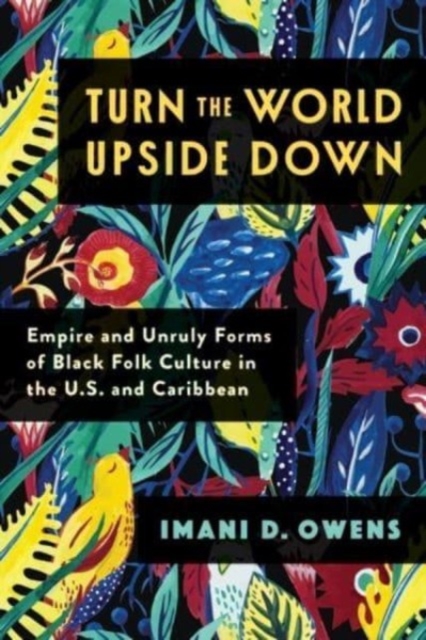Turn the World Upside Down: Empire and Unruly Forms of Black Folk Culture in the U.S. and Caribbean

Turn the World Upside Down: Empire and Unruly Forms of Black Folk Culture in the U.S. and Caribbean
In the first half of the twentieth century, Black hemispheric culture grappled with the legacies of colonialism, U.S. empire, and Jim Crow. As writers and performers sought to convey the terror and the beauty of Black life under oppressive conditions, they increasingly turned to the labor, movement, speech, sound, and ritual of everyday "folk." Many critics have perceived these representations of folk culture as efforts to reclaim an authentic past. Imani D. Owens recasts Black creators' relationship to folk culture, emphasizing their formal and stylistic innovations and experiments in self-invention that reach beyond the local to the world.
Turn the World Upside Down explores how Black writers and performers reimagined folk forms through the lens of the unruly-that which cannot be easily governed, disciplined, or managed. Drawing on a transnational and multilingual archive-from Harlem to Havana, from the Panama Canal Zone to Port-au-Prince-Owens considers the short stories of Eric Walrond and Jean Toomer; the ethnographies of Zora Neale Hurston and Jean Price-Mars; the recited poetry of Langston Hughes, Nicolás Guillén, and Eusebia Cosme; and the essays, dance work, and radio plays of Sylvia Wynter. Owens shows how these figures depict folk culture-and Blackness itself-as a site of disruption, ambiguity, and flux. Their works reveal how Black people contribute to the stirrings of modernity while being excluded from its promises. Ultimately, these works do not seek to render folk culture more knowable or worthy of assimilation, but instead provide new forms of radical world-making.
PRP: 198.40 Lei
Acesta este Prețul Recomandat de Producător. Prețul de vânzare al produsului este afișat mai jos.
158.72Lei
158.72Lei
198.40 LeiLivrare in 2-4 saptamani
Descrierea produsului
In the first half of the twentieth century, Black hemispheric culture grappled with the legacies of colonialism, U.S. empire, and Jim Crow. As writers and performers sought to convey the terror and the beauty of Black life under oppressive conditions, they increasingly turned to the labor, movement, speech, sound, and ritual of everyday "folk." Many critics have perceived these representations of folk culture as efforts to reclaim an authentic past. Imani D. Owens recasts Black creators' relationship to folk culture, emphasizing their formal and stylistic innovations and experiments in self-invention that reach beyond the local to the world.
Turn the World Upside Down explores how Black writers and performers reimagined folk forms through the lens of the unruly-that which cannot be easily governed, disciplined, or managed. Drawing on a transnational and multilingual archive-from Harlem to Havana, from the Panama Canal Zone to Port-au-Prince-Owens considers the short stories of Eric Walrond and Jean Toomer; the ethnographies of Zora Neale Hurston and Jean Price-Mars; the recited poetry of Langston Hughes, Nicolás Guillén, and Eusebia Cosme; and the essays, dance work, and radio plays of Sylvia Wynter. Owens shows how these figures depict folk culture-and Blackness itself-as a site of disruption, ambiguity, and flux. Their works reveal how Black people contribute to the stirrings of modernity while being excluded from its promises. Ultimately, these works do not seek to render folk culture more knowable or worthy of assimilation, but instead provide new forms of radical world-making.
Detaliile produsului









